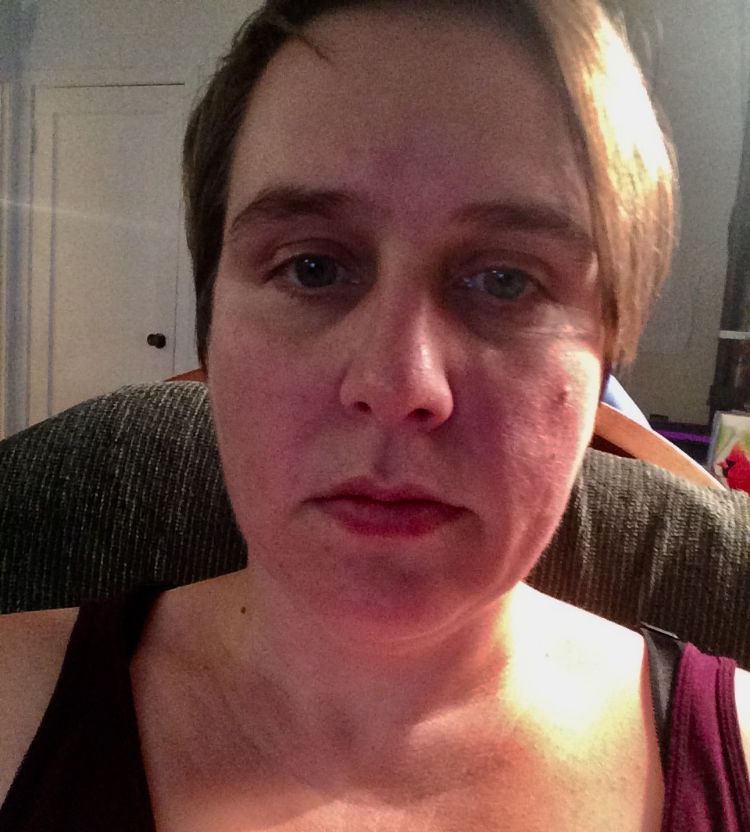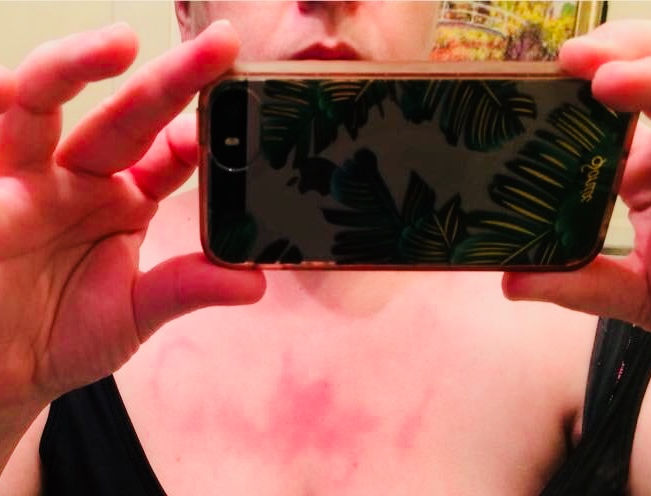According to my diagnostic tests, I should be healthy. So why do I take 12 pills a day just to eat and carry around two Epi-pens?
Welcome to the limbo land of those of us who have mast cell disease but are technically undiagnosed.
On a sunny September day in 2017, all seemed right in my body and my world. I was a year into a job I loved at a university. My kids were happy and well, and my sailor husband was home after a long deployment. The day was lovely and I was humming as I crossed campus.

That’s the moment I entered limbo. That’s when I started to itch.
It began on my inner elbows. Then the backs of my knees. Hives. Then the inside of my mouth started to itch. My tongue swelled. My throat hurt. By the end of the day, I was in the emergency room as a doctor injected me with epinephrine, the treatment for a severe type of allergic reaction called anaphylaxis.
I had developed an allergy, he said. He prescribed me an Epi-pen and said I must inject myself and call an ambulance if it ever happened again.
I awoke a few mornings later coughing and choking on my own tongue. Epipen, ambulance ride, another concerned doctor.
“You woke up in anaphylaxis?” he said, scratching his head. “Anything new in your bedroom? In the yard? Was your window open?” No, no, no. Now I was really scared.
It happened four more times in the next two weeks. I was terrified I was going to die. I was too scared to eat. But what frightened me most was the possibility the doctors wouldn’t believe me.
The kind doctor I had the first time was on shift again for my sixth anaphylaxis. “This isn’t normal. I don’t think this is an allergy. And I know you’re not making this up. I believe you. We are going to figure this out,” he said.
I was sent to an allergist/immunologist, the incomparable Dr. Kingsley Lee in Victoria. He believed me too. We started experimenting with medications to help my symptoms while doing diagnostic tests. Blood tests. Urine tests. Bone marrow tests. My bodily fluids and my marrow were even shipped to the United States.
To be diagnosed with a mast cell disease, a patient needs more than just symptoms. You need elevated tryptase in the blood, or strangely formed or too many mast cells in the bone marrow, or a particular gene mutation, or evidence of crazy histamine byproduct levels in the urine.
My test results? Normal, normal, normal.
 According to my tests, I should be healthy. I should not need 12 pills a day to eat without debilitating symptoms like stomach pain, diarrhea and hives. I should not wake up some mornings with such severe symptoms I need to take Benedryl on top of my regular meds to avoid an Epipen. I should never have anaphylaxis and should not carry two Epi-pens at all times. And yet, I do. Welcome to the limbo land of the undiagnosed.
According to my tests, I should be healthy. I should not need 12 pills a day to eat without debilitating symptoms like stomach pain, diarrhea and hives. I should not wake up some mornings with such severe symptoms I need to take Benedryl on top of my regular meds to avoid an Epipen. I should never have anaphylaxis and should not carry two Epi-pens at all times. And yet, I do. Welcome to the limbo land of the undiagnosed.
Not having a definitive diagnosis means I am at the mercy of the opinions of the health professionals in front of me when in crisis. There’s no declarative statement on my medical chart. There’s simply another doctor’s opinion I most likely have mast cell disease. If they have never heard of this constellation of illnesses, or “don’t believe” in them, there’s a real possibility they may not admit I am in anaphylaxis. Which means they may deny me treatment. Which means I could die.
Thankfully, my local emergency room is a safe place for me. Many other mast cell patients here in BC and throughout Canada are not so lucky. Others in this limbo are often belittled, disbelieved and in my opinion medically abused.
That’s why the work of the Mastocytosis Society Canada is vital for mast cell patients. We need to band together as patients and informed health professionals to educate Canada’s medical system about mast cell diseases. It’s a matter of life and death for patients like me in the limbo land of the undiagnosed.

Cindy MacDougall is a communications professional, mother of four and military spouse living in Victoria, BC.A former health reporter for CBC Radio and former newspaper columnist, Cindy has lived and worked throughout Canada.


